Importance of Health Checkup
Overview
In today’s world where everyone is busy, we often ignore the importance of proper health care. With the increasing pollution levels, unhealthy lifestyle, our body is constantly at risk of developing diseases that can sometimes even be life-threatening.
In such a scenario, regular health check-ups are really important as they help to identify any early signs of potential health issues before they become a problem. Early detection increases the chances of getting the right treatment quickly, avoiding any complications. Many factors, such as age, health, family history, and lifestyle choices, impact on how often health check-ups are required.
What are the benefits of regular health check-ups?
There are various benefits for regular health check-ups. It helps to
- Assess the risk of future medical issues
- Detect potentially life-threatening health conditions early
- Increase chances for right treatment and cure
- Limit the risk of complications by closely monitoring existing conditions
- Increase lifespan and improve health
- Reduce healthcare costs over time by avoiding costly medical services
- Prompts to maintain a healthy lifestyle
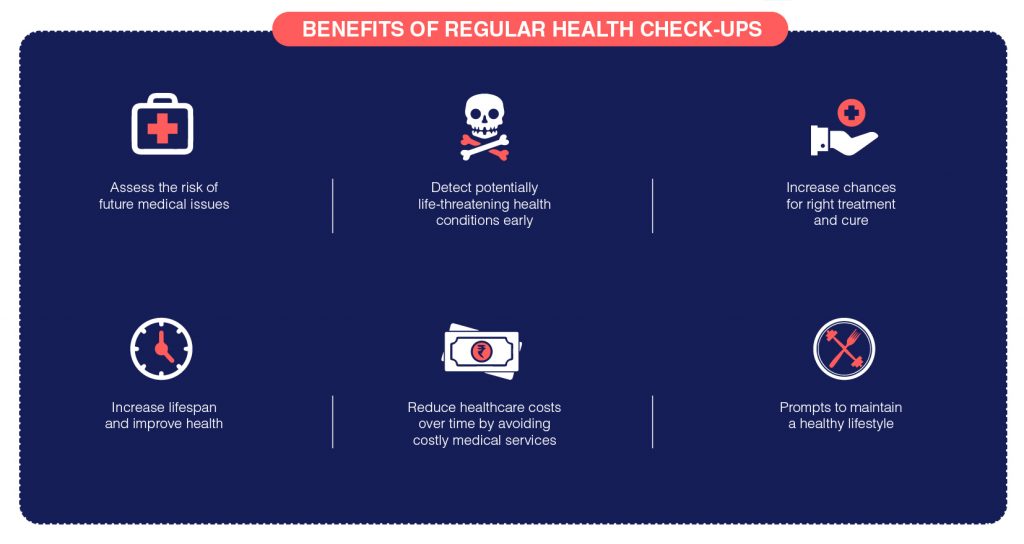
What to expect at a health check-up?
Here are some things you can expect at a health check-up:
- Clinical history: The doctor will regularly update your medical record such as cholesterol levels, blood pressure, BMI, immunizations, etc. for future reference at each health check-up.
- Family history of diseases: The doctor will inquire about the diseases that are hereditary in your family.
- Past medical history: The doctor will review all past medications and medical procedures such as surgeries.
- Lifestyle information such as working style, living conditions, work-life balance.
- Habits such as the use of recreational drugs, smoking, sexual habits.
- Normal body function information such as sleeping, bowel movements, hearing, vision, etc.
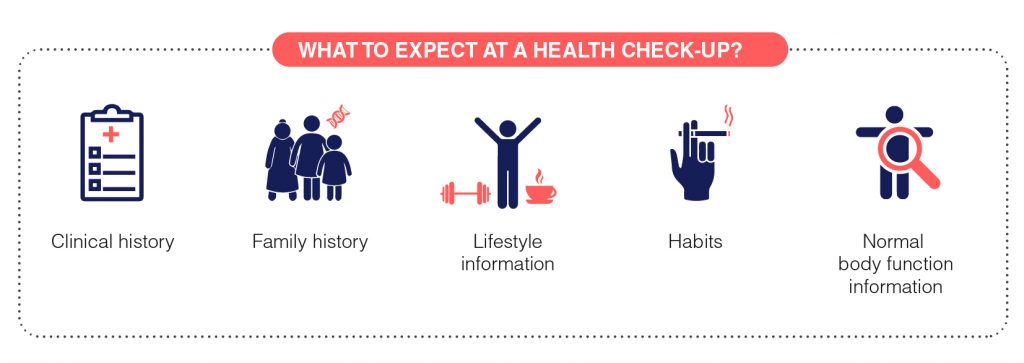
What are the tests covered in a regular health check-up?
The tests should only be carried out by an accredited laboratory that has the tools to carry out these diagnostic tests. Here are some of the tests that make up a regular health check-up.
- General physical exam including weight, height, blood pressure, pulse rate, etc.
- Blood tests help in determining infections, anemia, or onset of other diseases
- Lipid profile helps in assessing cardiovascular risk
- Liver function tests assess the functioning of the liver or diagnose liver diseases
- Kidney function tests evaluate the proper functioning of kidneys
- Blood sugar measures blood glucose levels to identify diabetes or pre-diabetes
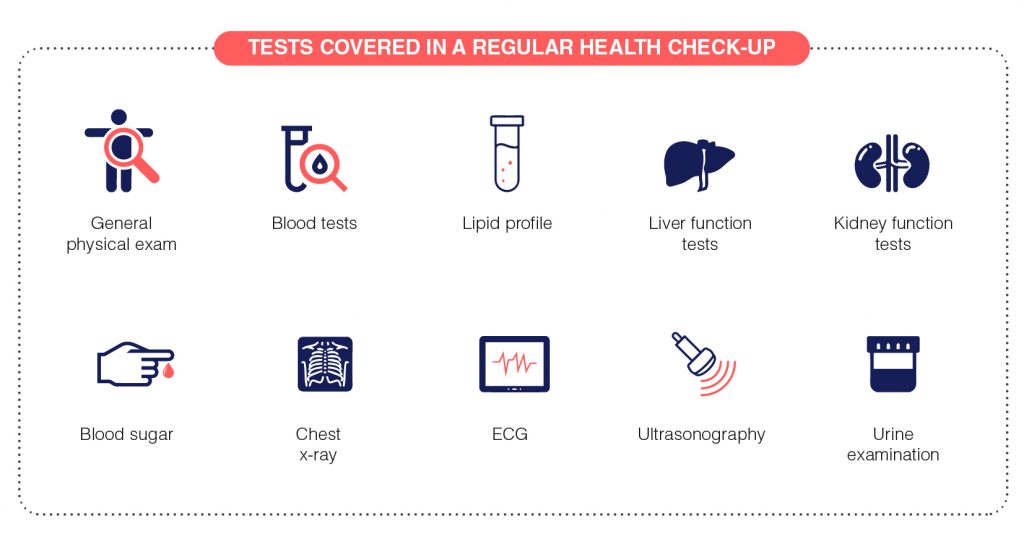
- Chest x-ray helps in assessing the chest and the organs located in the area
- ECG helps in determining the heart rate and uniformity of heartbeat.
- Ultrasonography helps in assessing the structures in the abdomen such as spleen, gallbladder, liver, pancreas, and kidneys
- Urine examination helps in the general assessment of health in terms of systemic or metabolic diseases.
What are the tests for health check-up of Heart?
Health check-ups for heart disease may include:
- Blood pressure measurement
- Blood tests to check cholesterol levels, blood triglycerides, etc. High levels may indicate an increased risk of various health problems, including heart disease.
- Electrocardiogram (ECG) detects heart abnormalities by measuring the electrical activity generated by the heart as it contracts.
- Echocardiography helps to monitor the functioning of the heart and its valves.
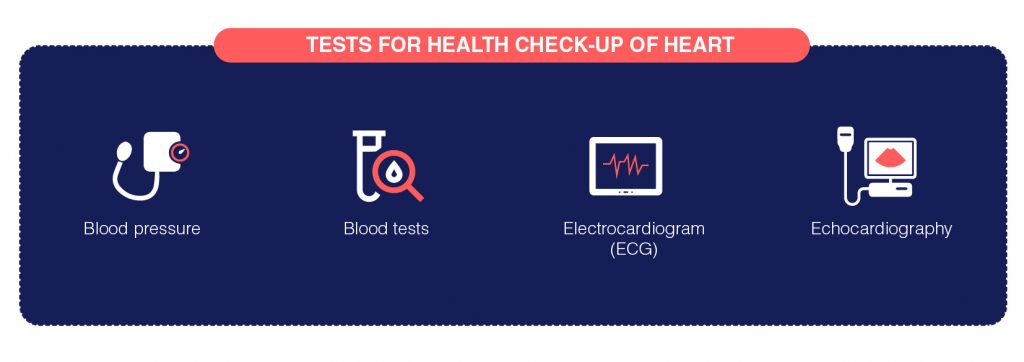
What are the tests for health check-up of Eyes?
Serious eye conditions such as glaucoma, cataracts, diabetic retinopathy, and macular degeneration are more common with age. People older than 65 years should have an annual eye examination. More frequent testing may be recommended for those with certain risk factors, such as:
- A family history of eye disease
- A personal history of eye disease or injury
- Certain medical conditions such as high blood pressure or diabetes
What are the Health check-up tests for older people?
It is very important to keep an eye on health for older people. The doctor may recommend below based on medical history and risk factors: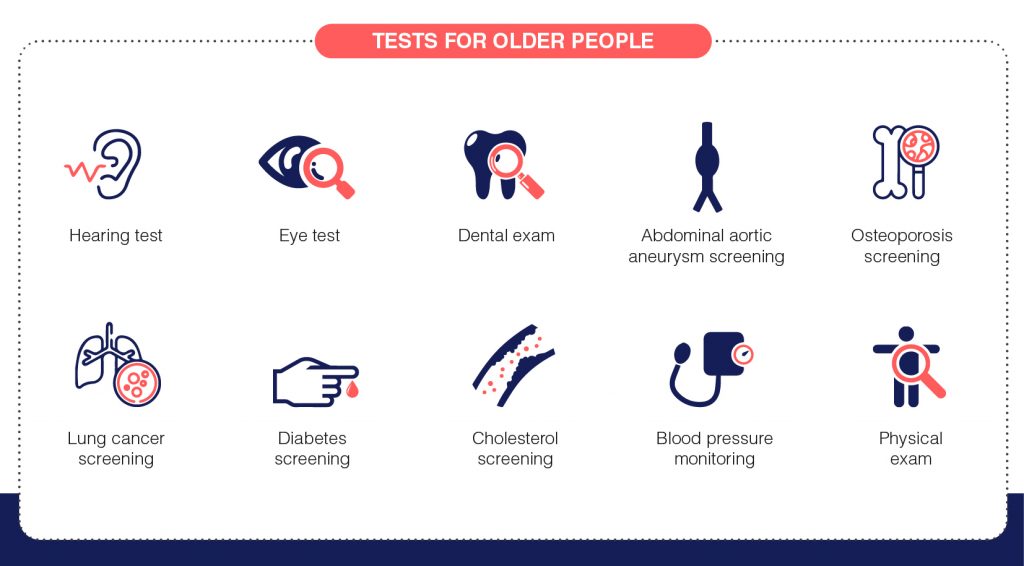
- A physical exam to check and record weight, height, and body mass index (BMI).
- Blood pressure monitoring is especially recommended for people with diabetes, heart disease, kidney problems, or certain other conditions
- Cholesterol screening especially for people with high cholesterol, diabetes, heart disease, kidney problems or certain other conditions
- Diabetes screening especially for people with obesity and have other risk factors for diabetes
- Lung cancer screening for current smokers and who have quit within the past 15 years
- Osteoporosis screening is especially recommended for people with long-term steroid use, low body weight, smoking, heavy alcohol use or a family history of osteoporosis.
- Abdominal aortic aneurysm screening to screen for a blood filled bulge in a major blood vessel in the abdomen called the aorta. It is especially recommended for smokers.
- A dental exam every year
- An eye test especially for people with vision problems or risk for glaucoma.
- A hearing test especially for people with symptoms of hearing loss.













